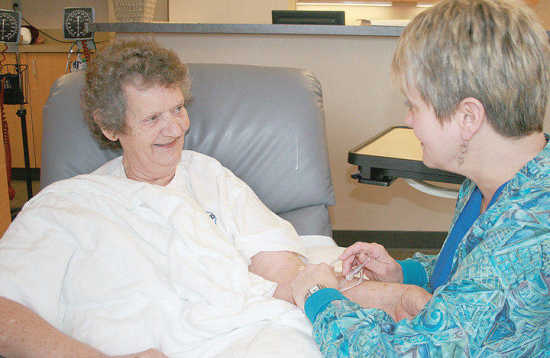Financial and physical tolls

A cancer diagnosis is frightening on several levels.
When Joan Patterson, 72, of Greencastle, was diagnosed with multiple myeloma -- a cancer of plasma cells in which collections of abnormal cells accumulate in the bones, causing bone lesions in the bone marrow and interfere with production of normal blood cells -- a number of things went through her mind.
"They told me there was no cure, so I just wanted to know how I was going to treat it," Patterson said.
Patterson "felt pretty good" when she was diagnosed with cancer. The myeloma was an incidental finding.
"I went to the doctor because I thought I had pneumonia," she said.
One of the most common forms of cancer treatment is chemotherapy -- the treatment of the disease using chemicals.
"You're basically using the chemicals to kill the cancer," said Georgeann Caine, a registered and oncology certified nurse at the Putnam County Hospital Cancer Center.
The cost of some chemotherapy is rising because the newer drugs can target specific cancer genes or cells.
"It's getting to where it's the old drugs versus the new drugs," said Putnam County Hospital Cancer Center RN and OCN Linda Mann.
Mann said patients tend to have the same basic fears as they begin cancer treatment.
"They want to know if the medicine will make them sick, make them lose their hair or affect their sex lives," she said. "The general public is probably more afraid of a cancer diagnosis than any other illness."
The key to making patients feel more comfortable, Putnam County licensed practical nurse Lou Fordice said, is education.
"The first day when patients come in, we encourage them to bring their families," she said. "We give them a lot of information in the way of leaflets and handouts. We give them nurses' phone numbers. We tell them what the common side effects of treatment are and what they should do if they arise."
Two important factors in the success of cancer treatment are positive attitude and family support.
"Those things are crucial," Mann said.
Fordice agreed.
"When people don't have the support of family, that can create its own set of problems," she said.
Patterson said she has gotten used to her treatments, although she still finds them "boring."
"I still don't like having to sit through it," she said. "But I know I'll have to do it for the rest of my life. At least I can still do the day-to-day stuff I normally do."
Patterson, who used to work as a cook at a sorority house at DePauw University, said her husband of 54 years, Keith, has been very supportive throughout her illness.
"He comes and sits with me," she said. "I've told him he can stay home, but he comes anyway. I don't know that I'd go and sit if I didn't have to."
Mann said another detriment for patients is that they have heard things about treatment secondhand from people who are not medical professionals.
"Sometimes they have misinformation," she said.
For all the nurses at the PCH Cancer Center, building a relationship with the patients they work with is essential. Oncology nursing is a whole different field, because nurses see the patients repeatedly, usually over a significant period of time.
"We develop such a strong rapport," Mann said.
The nurses also try to maintain an upbeat atmosphere in the center.
"I think the patients really enjoy the fact that we're not solemn or sad-looking," Caine said.
Cost is also a concern for cancer patients.
"It varies from patient to patient," Mann said. "It's complex and confusing. But when we have a patient who doesn't have insurance, we can help them. No one is ever turned away."
Cancer patients have a multitude of bills associated with their illnesses: doctor visits, clinic visits, procedures, lab work, imaging, drugs, radiation, hospital stays, surgery and home health care are just some of the expenses associated with cancer.
According to information at cancer.org, the average cost of a 30-day cancer drug prescription can top $1,600, and insurance co-pays are often higher for cancer treatment drugs than for other prescriptions.
The cost of chemotherapy can range from $100 to $30,000 for an eight-week course.
Patterson said cost was something she considered only briefly as she began her course of cancer treatment.
"I figured I was going to do it one way or another," Patterson said. "I decided I'd pay a nickel a week if I had to, or they'd put me in jail."
Patterson now goes once a month for treatment with Zometa, which is given by intravenous infusion.
"It takes two-and-a-half or three hours at a time," she said.
Patterson said her insurance has taken care of most of the cost of her treatments.
"I've probably paid about $500 out of my pocket a year," she said. "But I see the things that come from my insurance company, and I think for the medication and lab work it's about $4,000 each time."
Although the majority of chemotherapy patients experience some adverse side effects, Fordice said many of them tell her they expected much worse.
"The majority, when they're done, tell us it wasn't as bad as they thought it would be," Fordice said. "They're very relieved."
Patients with many types of cancer receive treatment at PCH. The most common types treated there are lung, breast, colon and prostate cancer and lymphoma.
The PCH Cancer Center is set up to treat patients who are 18 or older, and does not offer any radiation treatments.
"We are starting to see some younger people," Caine said.
As long as she has been in the field of oncology, Mann said she has never gotten used to losing patients.
"It still makes me very sad," she said. "But the one thing I take comfort in is that I made sure they knew they had an ally until the end."
